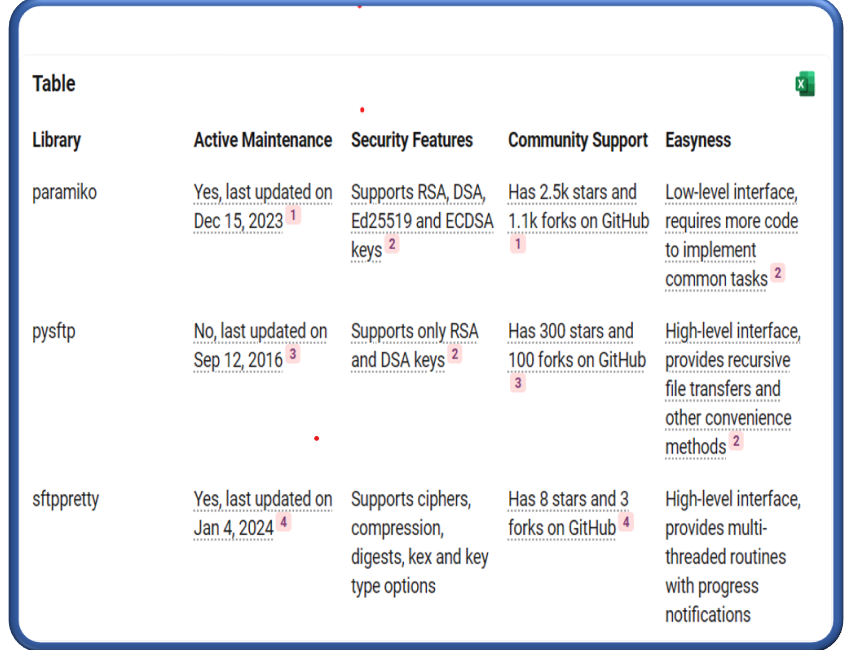Secure File Transfer Protocol (SFTP) is a widely used protocol for securely transferring files over a network. In Python, several libraries facilitate SFTP server access, with Paramiko, PySFTP, and SFTPpretty being among the popular choices. This article provides a comparative analysis of these libraries, highlighting their features and functionalities, and reveals that Paramiko serves as the core for each, ensuring robust SFTP server interactions.

Comparative Analysis of Paramiko Vs PySFTP Vs SFTPpretty:
Paramiko:
Paramiko is a comprehensive library that provides implementation of SSHv2 protocol, including SFTP functionality.
It supports various authentication methods, including password authentication and public key authentication.
Paramiko offers a flexible and extensible API, allowing users to customize their SFTP implementations.
PySFTP:
PySFTP is built on top of Paramiko and provides a higher-level interface specifically for SFTP operations. It simplifies SFTP interactions by abstracting lower-level details, making it more user-friendly. PySFTP supports both synchronous and asynchronous SFTP operations.
SFTPpretty:
SFTPpretty is another library that relies on Paramiko for its SFTP capabilities. It aims to enhance the user experience by providing a simplified interface with easy-to-use functions. SFTPpretty is designed to be straightforward and intuitive, making it suitable for users who prefer simplicity.

Paramiko as the Core:
All three libraries leverage Paramiko as the core for implementing SFTP functionality. Paramiko handles the underlying SSH and SFTP protocols, ensuring secure and efficient file transfers. This modular approach allows users to choose the library that best fits their needs while benefiting from the robust core provided by Paramiko.
Below some code snippets are given to access SFTP Server in Python using Paramiko:
Here are basic code snippets illustrating SFTP server access using Paramiko for different usecases:
- Setting Up the SFTP connection:
import paramiko
# Establish an SSH connection
ssh = paramiko.SSHClient()
ssh.set_missing_host_key_policy(paramiko.AutoAddPolicy())
ssh.connect('sftp.example.com', username='username', password='password')
# Open an SFTP session
sftp = ssh.open_sftp()
# Perform SFTP operations
# ...
# Close the SFTP session and SSH connection
sftp.close()
ssh.close()
2. Upload File to Remote Server:
import paramiko
def upload_file(local_path, remote_path, hostname, username, password):
# Create an SSH client
ssh = paramiko.SSHClient()
ssh.set_missing_host_key_policy(paramiko.AutoAddPolicy())
# Connect to the SFTP server
ssh.connect(hostname, username=username, password=password)
# Open an SFTP session
sftp = ssh.open_sftp()
# Upload the file
sftp.put(local_path, remote_path)
# Close the SFTP session and SSH connection
sftp.close()
ssh.close()
# Example usage:
upload_file('local_file.txt', '/remote/directory/file.txt', 'sftp.example.com', 'username', 'password')
3. List Files on Remote Server:
import paramiko
def list_files(remote_path, hostname, username, password):
# Create an SSH client
ssh = paramiko.SSHClient()
ssh.set_missing_host_key_policy(paramiko.AutoAddPolicy())
# Connect to the SFTP server
ssh.connect(hostname, username=username, password=password)
# Open an SFTP session
sftp = ssh.open_sftp()
# List files in the remote directory
files = sftp.listdir(remote_path)
# Print the list of files
for file in files:
print(file)
# Close the SFTP session and SSH connection
sftp.close()
ssh.close()
# Example usage:
list_files('/remote/directory', 'sftp.example.com', 'username', 'password')
4. Download Files from Remote Server:
import paramiko
def download_file(remote_path, local_path, hostname, username, password):
# Create an SSH client
ssh = paramiko.SSHClient()
ssh.set_missing_host_key_policy(paramiko.AutoAddPolicy())
# Connect to the SFTP server
ssh.connect(hostname, username=username, password=password)
# Open an SFTP session
sftp = ssh.open_sftp()
# Download the file
sftp.get(remote_path, local_path)
# Close the SFTP session and SSH connection
sftp.close()
ssh.close()
# Example usage:
download_file('/remote/directory/file.txt', 'local_file.txt', 'sftp.example.com', 'username', 'password')
Conclusion:
Paramiko, PySFTP, and SFTPpretty are valuable tools for interacting with SFTP servers in Python, each offering its unique advantages. While Paramiko serves as the foundation for these libraries, users can choose the one that aligns with their preferences and requirements. It’s crucial to note that Paramiko is actively maintained, ensuring continued compatibility and security updates. In contrast, PySFTP, though built on Paramiko, lacks recent development, and SFTPpretty, while actively maintained, may face challenges due to limited community support. Users should carefully consider their project requirements when selecting an SFTP library for Python.
References:
- Paramiko Documentation: https://www.paramiko.org/
- PySFTP Documentation: https://pysftp.readthedocs.io/
- SFTPpretty Documentation: https://github.com/bmwant/sftppretty
Comments
Loading comments…